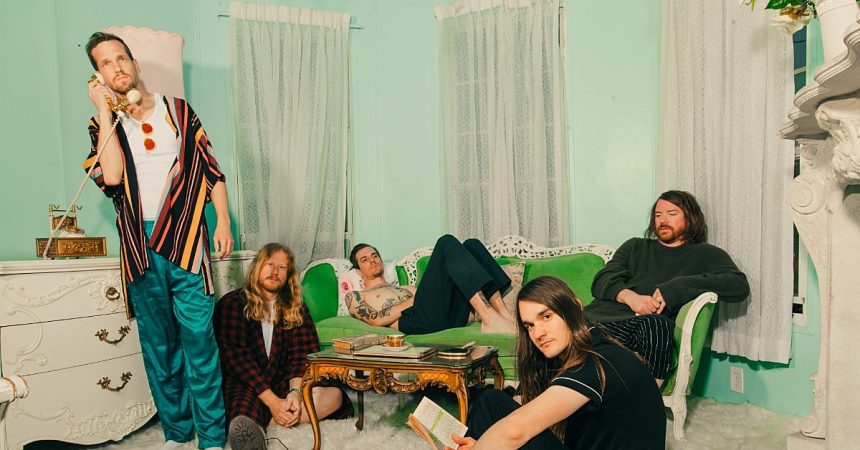We asked the Maine to provide an album breakdown, from Can’t Stop Won’t Stop to their latest self-titled record. The result is an in-depth look at the band’s eclectic history.
Read more: 20 greatest Hopeless Records bands
Can’t Stop Won’t Stop (2008)
JOHN O’CALLAGHAN: I know there is the old adage that you have forever to write your first record, but we really only had a couple of fucking months. [Laughs.] We were so brand new and green. I can’t even really recall having that many ideas.
JARED MONACO: We didn’t pull up [to pre-production] with enough songs to even make the record. Nobody really knew what they were doing. We just got in a room and whatever came out was pretty much what made it on that album.
O’CALLAGHAN: The recording studios we had been in before this record were about the size of a bedroom with not great equipment. When we went into the studio for this record, we had an unnecessary amount of confidence and naivety to do this. We lived in an oddly furnished apartment together. We were all 18 or 19 years old.
MONACO: Having that naivety and being young was important, and that’s what I remember about this record. It was all so new, and it still sounds that way to me when I listen to it, and I’ve grown to love that about it.
PAT KIRCH: I think the most important thing about that record is the variety. It isn’t all just right-down-the-middle pop punk. If we had done that, we wouldn’t have known where to go next. There was a lot of acoustic guitar, pianos, slide guitars, and it made it so we weren’t stuck in a box.
Black & White (2010)
O’CALLAGHAN: The confusing thing was trying to dial in who we are as a band and what we’re going for sonically. We were being told things by the label that we should be a modern Tom Petty kind of vibe, but internally, I don’t know what we were feeling, and we didn’t have much to base things off other than what people were telling us.
GARRETT NICKELSEN: We hadn’t had a misstep yet, and everything was working great, so we assumed everything would continue to go great.
KIRCH: The record label wanted to erase everything we had done before. They kept telling us we were in the big leagues now [with our signing to Warner Records]. The idea should have been more about building upon what we did, as opposed to ripping out a new page.
O’CALLAGHAN: For as arduous of a process as it was writing songs with other people, we had some really amazing sessions with people like [Grammy-nominated songwriter] Butch Walker. [We] also had some not-so-great experiences with others. I still remember that I was having fun regardless, and people at the label were positive and building us up. I personally fell into the “what if?” What if we were as big as Green Day? Through that record cycle, it showed that we didn’t get as big as Green Day, but it was the next step that set up the third record the way that it did.
NICKELSEN: It was fun, but not in the studio always.
MONACO: It was a little sterile. On the first record, we were just fucking around in the studio, and if you can’t have fun, fuck around and have a good time, you lose that character. With this record and going for a polished, big-production sound, I get it, but we were still learning what worked for us.
O’CALLAGHAN: The record still did well if we’re talking numbers, but in our collective eyes, we have the most to say about the record we care the least about. [Laughs.]
Pioneer (2011)
KIRCH: I have such fond thoughts on this album. It was so much fun to make and so much of an opposite to the previous record. It was back to the discovery process, fucking around, doing whatever we wanted, and then picking the record later. We recorded 27 songs and picked the 13 that should have been on the record,
NICKELSEN: We were just working on what was good at the moment, not thinking too much and just doing it. That’s honestly how the songs feel, and [we] weren’t afraid of anything.
O’CALLAGHAN: I feel like it’s the most chaotic, all-over-the-place and manic record that we have as far as vibes go. This was also the moment that we met [longtime collaborator, producer and engineer] Colby Wedgeworth. We went from the second record being so serious and uncertain to this record, where we did something crazy, doing it under the radar without the label knowing. We had no rules to abide by, which made it really fun.
NICKELSEN: I’ve said it before, but this record is a teenager. It’s rebellious, does what it wants and has a good time doing it.
KENNEDY BROCK: That’s exactly right. It’s still freedom but with a lot more determination.
Forever Halloween (2013)
O’CALLAGHAN: I think this was the record we were the least prepared for. We had sparse communication with [producer and co-founder of the Raconteurs] Brendan Benson prior to it, which added to the allure of it. The first week in Nashville [where we recorded the record] was pretty fucked up.
MONACO: I was terrified. [Laughs.]
KIRCH: It flipped the idea of what recording was to us. When we got there, I don’t think Brendan could see how different his process was compared to ours and how crazy it was. We thought we would spend a couple of weeks working on the songs, but instead, we just went straight into recording.
NICKELSEN: On the first day, we recorded live with John in the same room doing vocals with the drums 5 feet away. [Laughs.] We got thrown into a completely different environment than before, and we didn’t get time to think if the songs were good.
MONACO: It was so different, and how we always made records, the foundation was convenient. For this record, it was anything but.
O’CALLAGHAN: Once we got out of our own way, and stopped worrying if it was going to be clean or pristine, it became really awesome. Everybody remembers this one moment where Brendan was shirtless smoking a cigarette on his back with plumes of smoke in the sky, and for a brief second, it felt like what a Rolling Stones or David Bowie session must have been like in ’60s or ’70s where everyone is vibrating at the same frequency, all tuned in and working towards one take where you can say, “That’s it.”
MONACO: Having that divide between us and Brendan was integral to making this record become what it was.
O’CALLAGHAN: It also was affirming of our ability as a band. Brendan treated us as equals and as peers without looking down at us or as subjects.
KENNEDY BROCK: Having that come from somebody who was in a band that we greatly respected was a cool and different perspective that we hadn’t had before. He really opened a lot of doors for us.
American Candy (2015)
O’CALLAGHAN: I don’t think we’ve ever had a scenario as obvious as this one. We had back-to-back records where we had something to rebel against. With Pioneer, we were rebelling against an idea and the establishment, and with this one, we were rebelling against the somber experience we gave people with Forever Halloween. I remember the discussion when I brought up wanting to do something more optimistic for this record. It was a good challenge to do it and make sure it wasn’t overtly poppy and still have some fangs.
To see the reaction that it garnered, it was a harkening back to the Myspace days where there was a tangible feeling of the response. The clubs we were playing got a little bigger, and the response online got a little more loud and feverish. On Warped Tour after the record came out, I remember that being the moment where we allowed more people into the fold here and to not get hyperspecific on just one mood.
NICKELSEN: The biggest thing was giving away some of the protection we hold and giving it to Colby Wedgeworth, the producer, to guide the songs and take a leadership role. It changed everything for us.
KIRCH: Once we did the first two songs, “English Girls” and “Miles Away,” we were on cloud nine. I had never felt so good and knew we had something that people were going to enjoy. The rest of the record was the icing on the cake.
NICKELSEN: All I think about is that we were so happy making it. The excitement felt really cool, and the tours on that record were great. It was like restarting in a way.
Lovely Little Lonely (2017)
KIRCH: After American Candy, we had the attitude for the first time to not break everything that we just did and flip it on its head. We wanted to continue to build upon the last record and improve upon it.
NICKELSEN: We went into it as if it were our second album, and if you listen to this record and American Candy, they are somewhat similar or complementary at least. Giving Colby even more leadership really guided a song like “Black Butterflies And Deja Vu” to what it was, which happened a few times on this record.
KIRCH: Again, this record was awesome to make, and when we finished the song “Bad Behavior,” it was that exact same feeling of confidence. I remember listening back to it and jumping around and being pumped. As incredible as it all was, it felt like our time with Colby to do that again couldn’t happen with the next record. We had done what we were supposed to do with that time period.
NICKELSEN: The recording of that record was at the most beautiful place in the planet, but was impossible for gear. Everything kept breaking, so we only used this one Orange amp that worked for the whole record, which had a frustrating aspect, too.
MONACO: That changed my philosophy on gear forever, where I’m like, “Fuck it, I’ll play whatever if it works.” [Laughs.]
You Are OK (2019)
KIRCH: To be honest, after our first record, we hadn’t talked to [Can’t Stop Won’t Stop producer] Matt Squire in years, but we remembered how much he brought out of us. We love what Colby did for our band so much, but felt like Matt could help pick what songs are the best and take an idea from a B to an A. We wanted to make the best record at that time, so we went back to Matt. We did feel a little lost on where to go with this album.
O’CALLAGHAN: We knew we didn’t want to do something similar to Lovely Little Lonely. This was the most difficult record for us to wrap our heads around because we didn’t want to deviate from the feeling of people being energized by our band, but we still wanted to deviate musically and try something new. That’s where all the string arrangements [on the record] came from. We had never had too many session players come in before this record, so it was really cool to hear it back. In that time and era, we had some really real elements that helped the record stand out against other records that came out around that time.
KIRCH: That record showed us that we needed songs for the live shows, and I think that’s what we got with this record. When I think of this record, I think of the shows. These songs, to this day, bring more energy to our live show that is even more important than what the album could even be.
O’CALLAGHAN: I feel like potentially the messaging behind the record was more important than any given song. This record generated the most tattoos we have seen, and I think the sentiment behind it resonated with a lot of people.
XOXO: From Love And Anxiety In Real Time (2021)
O’CALLAGHAN: The big thing that I think all of us failed to collectively realize is that we did produce this record “ourselves.” However, we had our good friend Matt Keller engineer it and play an overseer role, as well as Colby helping to facilitate all of the sounds and help us get streamlined. [Creating this record] was similar to Pioneer, and we learned so much from this experience, especially having 27 songs written for it. We had a more direct idea of the songs this time and knew we only wanted to record the good ones. [Laughs.]
There were a few that didn’t make it because not everybody was on board with them, and with this record, everything you hear is songs that everyone was on board with. Normally, you make a record and go on tour to read the room and see if people are on board, so it’s been interesting to not have that [right away]. With this new tour, it’s a really exciting time to bring it all together and deliver it to people for the first time in a room.
The Maine (2023)
O’CALLAGHAN: There were really only two questions that dictated the writing and recording of our self-titled…
1. How will it translate live?
2. Do the six of us, Colby included, love it?
Tempo and feeling have always been concepts we’ve vaguely talked about on other records, but it somehow took us eight of them to actually put it into action. We looked to tunes that either demanded our bodies to move or made our hearts want to break for inspiration and did our damndest to achieve those same feelings in these songs.
I’ll remember a lot from recording No. 9, but the thing I’ll remember most fondly is the sense of a forgotten youth I felt throughout the process. Much of it had to do with reuniting with [producer] Colby Wedgeworth, and much of it had to do with an idea in my head that resounded, “What if this is the last time?”









